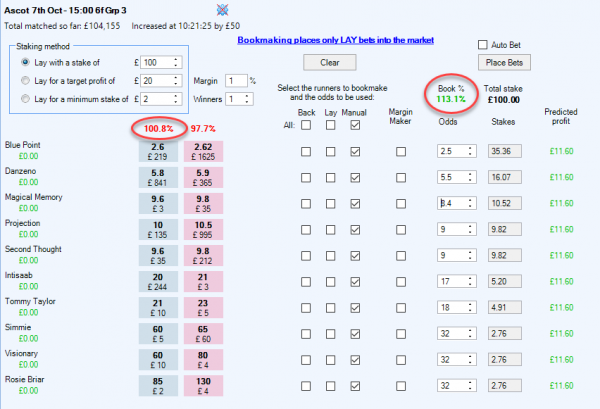Back when I was young, I stumbled into the world of bookmakers. I arrived there via the football pools. I didn’t really see punting on the football pools as gambling but thought I’d apply similar techniques at the bookmakers. But I soon realised there were a few problems doing this. It all revolved around one question ‘How do bookmakers work?”
I hadn’t discovered the world of horse racing just yet and free bet offers didn’t exist. Betting apps hadn’t been invented so when I started the only way I could place my bets were via betting shops on the high street. You now have sportsbooks and a variety of betting sites offered by betting companies. But while the way you bet has changed, the underlying reason why you lose money hasn’t really changed much. It’s all to do with the way the bookmakers set the odds.
Problems with using a sportsbook or bookmaker
The first problem I had was getting my bet on, I couldn’t really bet in the size I wanted without being limited. Secondly, I could only do plain old vanilla betting. If I tried something more complex, I’d often get my bets rejected and it was too painful to go through the process when I didn’t know if I had an edge. I came up with a really smart way of capturing value on improbable events, but it involved placing hundreds of bets. Figuring something was up, bookies simply referred the bet to head office who rejected it.
Then finally I realised that, in fact, one thing was the biggest killer and an impossible barrier to overcome. The bookmakers over-round.
Sportsbooks and bookmakers house edge – The overround
The over-round is the theoretical margin a bookmaker makes when they price a market. At decimal odds of 4.00 a selection has a theoretical 25% of winning. You would calculate your selection’s chance by dividing the decimal odds into 1. So 4.00 = 1/4.00 = 0.25 or 25%.
If you have a four-runner race then add of these together and that equals 100%, that’s a fair market. Any one of those selections has a chance of winning, so the chance of any one of those winning is 100%. If you had a field of four priced at 4.00 the market is ‘perfect’ and in the long term punters wouldn’t win or lose against a 100% book. At 100% the book has zero over-round, zero house edge. The bookmaker margin would be zero, as there is a 100% chance of any selection in that sport winning and the book is priced at 100%.
How bookmakers make money
The reality is that Bookmakers never price a market like this as there would be no money in it for them. It’s more likely to be five selections at 4.00 for a 125% book. So that means that, over time, they will return 125% for only ever risking 100%. The bookmaker’s margin is 25%, a bookmaker wouldn’t price a coin toss at 50%, it would be more likely 40%, giving them 20% margin. The general rule of thumb is the bigger number of selections the larger the over-round. Online bookmakers are often a little more competitive than high streets. But the same rules apply.
If you want to play around with this concept, fire up a copy of Bet Angel and you can ‘be the bookmaker’ and play around with prices and the over-round. It will give you some decent insight into how to price a market and how prices will influence odds in a market. Click on the ‘manual’ column so you can play around with the prices and see how they affect the book value.

Differences between bookmakers and the exchange
I took a sample of races and found the following at bookmakers. A 17 runner, 130%, 8 runner 112%, 20 runner 130%. So you can see that some metrics come out of that immediately. Now, compare these to the over-rounds at SP on the exchange, these were 98.7%, 97.7% and 100.2% respectively for the same races. Yes, that’s right the prices on the exchange we so competitive that you could have backed at better than the chance of the event occurring on two of those three races and the third was only out by 0.2%!
If you look at the Grand National the book often reaches 150%+ but on the exchange is only slightly over that magic 100% mark. No bonus amount on the big race of the year is going to make much of a dent in on that 50% bookmaker profit.
Summary
In summary, even excluding skill factors and other favourable characteristics. When you are betting on sportsbooks or against a traditional bookmaker you can’t possibly win in the long term. Even if you win short term, the more you play, the more likely you are to lose as the bookmaker’s edge will eventually play out.
The over-round is so low on betting exchanges that I have come up with many value-based strategies based purely on picking off prices that are just too good to not take.
On a betting exchange like Betfair, Betdaq or most of the popular sites, you can. Nobody sets the prices, you set the price. You will not be limited and all bets are honoured. It’s your skill to pick a winning bet at the right odds that determine your long term profitability. That, in a nutshell, is why exchanges are just so much better places to bet than sportsbooks or traditional bookies, by a country mile.
But hopefully, you can see why there is no good reason not to place your bet on an exchange and not with a traditional bookmaking service. I never dreamed 20-30 years ago that prices would be so competitive and you would have so many opportunities to take advantage of them. Therein lies the opportunity.
Without betting exchanges, I never would have been able to be a professional gambler/trader. So I’ll always be grateful for that.

